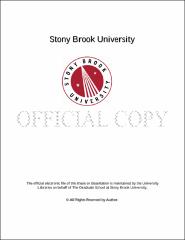| dc.identifier.uri | http://hdl.handle.net/11401/77540 | |
| dc.description.sponsorship | This work is sponsored by the Stony Brook University Graduate School in compliance with the requirements for completion of degree. | en_US |
| dc.format | Monograph | |
| dc.format.medium | Electronic Resource | en_US |
| dc.language.iso | en_US | |
| dc.publisher | The Graduate School, Stony Brook University: Stony Brook, NY. | |
| dc.type | Dissertation | |
| dcterms.abstract | Working at the sometimes embattled intersections of critical race theory, biopolitics, and trauma and memory studies, my dissertation examines the relationship between the narratives of historical traumas and the biopolitical zoning of life in twentieth-century literature and post-9/11 film. My use of the term “zone†alludes to Roberto Esposito’s imagining of biopower’s optimization of life as an immunitarian enclosure, or the privatization of life and its sustaining resources, and its consequent foreclosure of the ethical obligations of communitas. Foregrounding the geographical, temporal, and affective meanings of “zone†and “zoning†each chapter examines zones that are relegated to the peripheral “elsewheres†of Michel Foucault’s and Giorgio Agamben’s once-dominant cartographies of biopolitics: the Jim Crow South and the plantation state; the immunized residential communities of the white, upper-middle class of apartheid South Africa during its states of emergency in the 1980s; the slave ship and red-lined, domestic spaces of black, American subjects; and the secured and the invaded homelands that exist within the imperial viewfinders of U.S. neoliberal and counter-terrorism policies. I navigate these zones and terrains through modernist and post-colonial literature and post-9/11 films that depict archival bodies or racialized subjects as archival bodies inscribed, as Christina Sharpe has argued, with histories of slavery and colonization. These archival bodies, I maintain, both reflect and contest how the management of public memories of historical traumas can be co-constitutive the zoning life and death that occurs through the biopolitical apparatuses of racializing capitalisms. | |
| dcterms.available | 2017-09-20T16:52:53Z | |
| dcterms.contributor | Kaplan, E. Ann | en_US |
| dcterms.contributor | Marshik, Celia J | en_US |
| dcterms.contributor | Pease, Jr., Donald. | en_US |
| dcterms.contributor | Munich, Adrienne | en_US |
| dcterms.creator | Walsh, Rachel Ann | |
| dcterms.dateAccepted | 2017-09-20T16:52:53Z | |
| dcterms.dateSubmitted | 2017-09-20T16:52:53Z | |
| dcterms.description | Department of English. | en_US |
| dcterms.extent | 318 pg. | en_US |
| dcterms.format | Monograph | |
| dcterms.format | Application/PDF | en_US |
| dcterms.identifier | http://hdl.handle.net/11401/77540 | |
| dcterms.issued | 2015-05-01 | |
| dcterms.language | en_US | |
| dcterms.provenance | Made available in DSpace on 2017-09-20T16:52:53Z (GMT). No. of bitstreams: 1
Walsh_grad.sunysb_0771E_12678.pdf: 1920744 bytes, checksum: 1290c4d0f49460f80bc326d9bf3108ea (MD5)
Previous issue date: 2015 | en |
| dcterms.publisher | The Graduate School, Stony Brook University: Stony Brook, NY. | |
| dcterms.subject | American literature | |
| dcterms.subject | apartheid, biopolitics, counter-terrorism, memory, race, slavery | |
| dcterms.title | Disciplines of Memory, Zones of Life: Archival Bodies in Biopolitical Times | |
| dcterms.type | Dissertation | |

